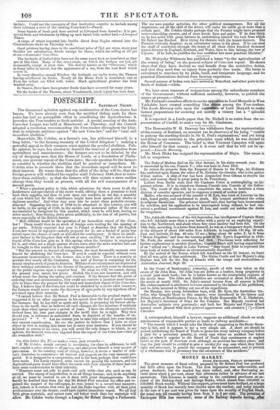" If Mr. Cobden should succeed in convincing the class lie
addresses, he will both render a great service to all parties, and also prove himself a very master of pia-suasion. In the existing state of things, however, it seems a matter of ordi- nary discretion to concentrale all interest and support on the very measure pro- posed. It is designed for a compromise, and is the best, perhaps, that could have been made. TheLords required some excuse for passing the measure, and the Agricultural party would have filled the earth with their outcries if there had not been some condescension to their infirmity. • • • "Measures must not only be good---not only noble—but also such as can be tarried. The stamp of imperfection is on all things human; and, to do anything at all, we must be content to see it done with great disparagements. It can hardly be doubted that from the day Sir Robert Peel resumed his office and re- gained the support of his colleagues, be was bound to a second-best measure; nor, indeed, is it certain that even be and the Duke together, with all their joint predominance over the Senate, could have carried immediate repeal. We all deal with given materials, and cannot tarn out better work than our materials will Allow. Mr. Cobden works through a League, Sir Robert through a Parliament. The one uses popular agitation, the other political management. Not all the impatience, not all the skill of the driver, will make his cattle go at more than a certain pace. Mr. Cobden thinks perhaps that the Premier might have proposed more—something greater, and of more heroic form and guise. If he does think so, he has acted with great fairness in undertaking himself the task from which Sir Robert has flinched. He is trying his rhetoric with the tenant-farmers. The Premier evidently despairs; so an adventurer comes in his place. If he can send the shaft of conviction through the heads of all those three hundred thousand tenant-farmers in England, Scotland, and Wales, then to him belongs the bow of Ulysses. If he fails, he justifies the less confident but more practical Minister."


























 Previous page
Previous page